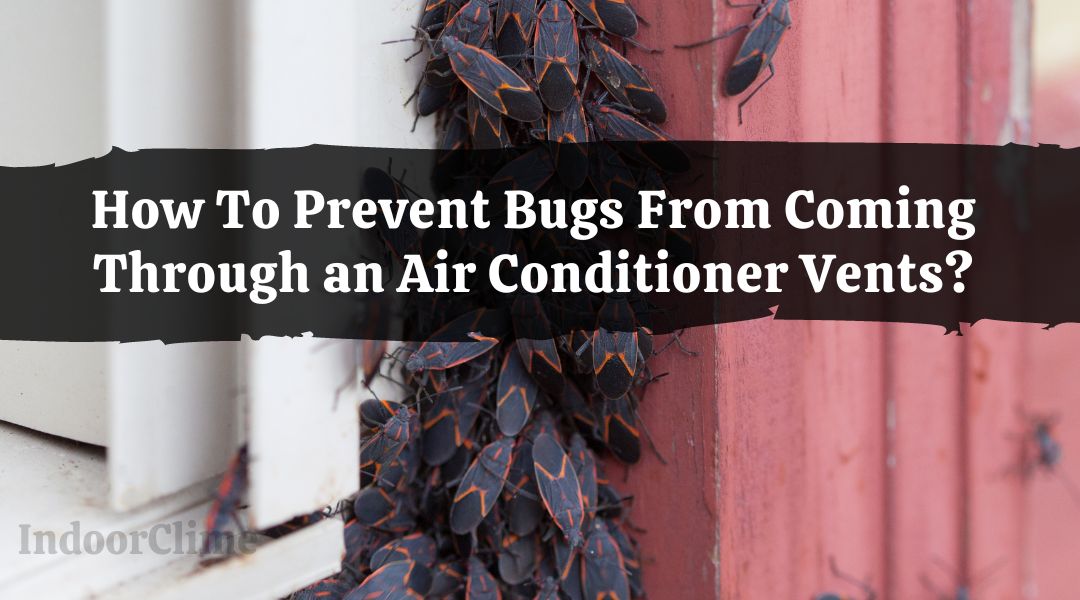Spiders, cockroaches, mosquitoes, and ants are among the bugs that come with summer. The critters can fly or crawl through the tiniest spaces searching for food and shelter, and your house is the best place to find both. But, for a good reason, bugs are unwelcome in any home.
So, if you’ve observed bugs in your home, you might wonder if they entered via the central air conditioner.
Bugs can enter through tiny cracks and holes, including those in central air conditioners. In addition, certain insects and other small creatures may be attracted to the condensation and moisture produced by these units.
In this guide, you’ll learn how to keep bugs and prevent them out of your central air conditioner.
You can prevent bugs from coming through air conditioner vents by starting to look at your home’s exterior; if there are any cracks, caulk up the gaps. You could also remove anything that could attract bugs near your condenser, like trash cans, a woodpile, grass clippings, or mulch. You may also want to utilize window screening outside your air conditioner.
Can Bugs Come Through Air Conditioner Vents?
Yes, bed bugs can get into your home through the vents. Bed bugs, fortunately, do not have wings and thus cannot fly or jump, but they can travel long distances if carried by a carrier. Luggage, suitcases, purses, gym bags, and even your vent could be carriers.
The primary reason bugs creep through air conditioners is that no seal is lit. There is always a tiny gap between the AC unit and the window. Because it’s so tiny, you can’t see it. Minor bugs can quickly get inside if you don’t seal your home unit.
Bed bugs prefer to build their nests in completely hidden locations and operate under cover of darkness to avoid detection by humans. Although your vent may not be the best place for them to live, they can exploit its night and use it as a temporary cover if their nest is nearby.
What Attracts Bugs To Air Conditioners?
Bugs are drawn to the air conditioner for food and shelter. They are always looking for new places to live and food and water.
They always enter the house through the air conditioning pipes. Food odors, air conditioner Freon, and the dots that appear from the compressor sock are all known to attract bugs.
How Do Bugs Get Into My HVAC System?
Bugs enter air conditioning for various reasons, one simply because they can. This is usually the outcome of a faulty seal. Bugs are constantly on the lookout for water and food.
Bugs may be attracted to the smell of food, which they can detect through your air conditioning, or they may be looking for water, which they find in condensation.
Some may believe keeping their homes cold will keep bugs out of their air conditioning system. But unfortunately, this does nothing to prevent bugs from trying to get into an air conditioner.
In addition, if it’s scorching outside, bugs may be drawn to cooler air even more.
What Kind of Bugs Can Get Through My Air Vents?
When you notice something crawling across your floor, you easily forget that bugs want the same things you do. They require light, shelter, and constant food and water supply. All of this can be found in the comfort of your own home.
Ants

While most species are harmless, be cautious of red harvesters and southern fire ants, as they can bite.
Bedbugs
These tiny insects are four to five millimeters long, flat, and brown. Bedbugs can be identified on your mattress by small dark spots or stains.
Wasps and Bees
They rarely sting unless provoked. Wasps can inflict multiple wounds, whereas bees only die after one. Pierce’s disease, which they cause, can cause severe damage to grapevines and vineyards.
Lice
Lice burrow in the hair and skin and are spread through physical contacts, such as brushes, hats, and other clothing.
Mosquitoes

These blood-sucking insects are found in lagoons, streams, and other bodies of water. During the day, the invasive species Aedes poses a threat and may carry diseases like Zika.
Scorpions
Small insects, lizards, and rodents are prey to these nocturnal predators. Strikes from local scorpions are non-lethal and feel like a bee sting.
Spiders
The red hourglass stamp on the abdomen of the black widow is well-known, while the brown widow is tan with a sequence of white stripes. Both can be found in dark, familiar places like backyards, playgrounds, and gardens.
Fleas And Ticks
Ticks hitch themselves to the skin of their hosts and feed on their blood. They are commonly found in wooded areas. Their tiny, flat, eight-legged stature distinguishes them.
How To Prevent Bugs From Coming Through Air Conditioner Vents?
There are several ways to “bug-proof your air conditioner,” but these are the tried-and-true methods that produce acceptable results. Depending on your AC unit setup, these methods may or may not apply.
The most efficient way to get rid of bed bugs is to seal your window air conditioner, which you can do by following the steps below.
Fill In Any Holes Or Cracks That You Find
Begin by going outside and visually inspecting the area around your condenser. Are there any visible cracks or holes? The simplest solution is one that you can carry out on your own.
Get some caulk or concrete from local hardware stores like Home Depot or Lowes. Fill in the holes and cracks with a small amount of the material.
Seal Any Noticeable Cracks Along the Ductwork
Bugs in the basement or attic can easily squeeze through or enter the ducts through a pre-existing hole. Examine the connections between each section of accessible ductwork, particularly the joints. Pay special attention to any parts that appear to be kinked or twisted.
Turn on your air conditioner, then place your hand over the ducts; if you feel the air against your hand, you have a loose connection or a leak. Duct tape can be used to seal any cracks that are less than an inch wide. It’s good to seek professional help if you have extensive cracks or leaks in hard-to-reach areas.
Maintain Your Landscaping
Most summer bugs are attracted to patchy, overgrown grass. The general rule is to keep anything 2-3 feet away from your condenser, whether planted, a small fence, or a decorative barrier.
Like everything else, your condenser requires oxygen to function correctly. This area allows for proper airflow, prevents debris from entering the condenser, and keeps bugs out of your AC system.
Install a Rock Garden
There are a variety of reasons why rock gardens are becoming increasingly popular. This landscaping design trend is long-lasting and drought-resistant.
All of the materials used in these gardens are organic. Gravel, stone, bricks, rocks, mosses, and succulents are commonly used materials.
Maintain The Cleanliness Of The Outdoor Unit
The outside vegetation acts as a bridge for bugs to enter the house through the air conditioning unit. As a result, trees, fences, and other plants should be kept at least two to three feet away from the outdoor unit.
Free the area around the condenser of any sticks, woodpiles, cans, leaves, or other debris. To keep tree insects from landing on the AC and getting into the house, trim the trees to keep the branches at least seven feet away from the unit.
Many of the summer bugs on this list won’t be able to survive in most rock gardens. Also, there are no small pools where mosquitoes can breed because of the reduced water use.
Maintain Your Gutters and Downspouts
Much debris can get blown into your gutters and downspouts during the dry months. And it appears that once a small amount of material is introduced, it attracts more and more.
All of this loose organic matter could be ideal for a pest nest. Insects like cockroaches, spiders, and other insects can live in your gutters and downspouts.
According to ASI, check your gutters and downspouts for buildup, debris, and bugs. If you observe something that needs to be removed, do so before it becomes a significant issue.
Make Sure The Unit Is Installed Correctly
Bugs can enter through an improperly installed air conditioner. If you’re considering installing, you might connect the unit loosely to your ductwork, leaving gaps where bugs can get in. Install air filters in the majority of the vents as well.
Bugs and debris that attract pests will be trapped if you have thick enough and the right size air filters. Replace or clean the air filters every three months if you have a shedding pet or live in a dusty area, but every month if you have a shedding pet or live in a dusty place.
Whenever Possible, Stop Water Leaks
Nothing attracts cockroaches more than a small water leak in an excellent environment—a water leak from your condenser, for example.
Go outside and check on the appliance from time to time while running. Make sure there aren’t any leaks. Water coming from your condenser could mean a problem with the refrigerant line.
Cover The Vents With Screens
Screens can keep bugs out of both indoor and outdoor air vents. Install the screening around the outdoor unit if you have a window AC to keep bugs and fly pests out.
Ensure the screening is installed correctly, as small gaps will allow bugs to enter the house.
Keep Up With AC Tune-Up
Maintaining your air conditioner regularly will help keep the bugs at bay. A technician will clean your AC parts professionally to remove dust and dirt.
They will also assist in eliminating any pests trapped in the air conditioner and remove any food sources that may attract bugs.
Do Bugs Like Air Conditioning?

Yes. The majority of bugs prefer air conditioning. The cooler air will appeal to most bugs, especially if it is hot outside. Bugs usually flee to a more incredible location if it’s hot outside.
Because they are captivated by cooler air, they will find a mechanism in your home if you have the air conditioner on.
Other pests attracted to AC units are cockroaches. As a result, heat is produced by the air conditioning system, which cockroaches enjoy. In addition, the enclosed and dark nature of AC units creates a haven.
Can Spiders Get In Through Air Conditioner?
Any time of year, spiders can quickly get into your ductwork, vents, and indoor air conditioner. While they aren’t harmful to your HVAC system and helpful outside, you don’t want them in your ductwork or crawling into your home.
Spiders commonly use two methods to gain access to people’s homes. The first is readily apparent – through windows, doors, cracks, gaps, holes around piping, vents, and other openings. Therefore, screens should be appropriately installed in Windows.





